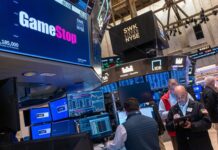European markets were flashing red after a lethal cocktail of news, including mergers between both Sainsbury’s and ASDA as well as Deutsche Bank and Commerzbank breaking down, growth worries in Germany and investment bank turmoil.
How did markets perform?
The Stoxx 600
SXXP, -0.12%
was down 0.2% to 390.2, adding to Wednesday’s modest decline of 0.1%.
The U.K.’s FTSE 100
UKX, -0.25%
fell 0.4% to 7,445.1. It ended Wednesday’s trading down nearly 0.7%.
The pound
GBPUSD, -0.1550%
fell 0.1% to $1.2886, erasing Wednesday’s rise of 0.1%.
In Germany, the DAX
DAX, +0.00%
DAX, +0.06%
dropped 0.1% to 12,301, after rising 0.6% Wednesday.
France’s CAC 40
PX1, -0.10%
was 0.2% lower at 5,566.3, following Wednesday’s 0.3% dip.
Italy’s FTSE MIB
I945, +0.05%
was flat at 21,719, having fallen 0.8% Wednesday.
The euro
EURUSD, -0.1614%
sank 0.1% to $1.1145 after ending flat Wednesday.
What’s moving the markets?
U.K. Prime Minister Theresa May once again avoided a personal defeat when a committee of backbench Conservative Party MPs decided not to pursue rule changes that would allow a leadership challenge before December. She was on track for a fourth major Brexit defeat for her government, however, as speculation heated up that the thrice-defeated withdrawal agreement would be put before parliament again next week.
In economic data, the Bank of Japan decided to keep rates unchanged and changed its forward guidance to indicate rates will remain very low through next spring. The bank’s guidance indicated modest economic weakness to come, largely driven by conditions outside the country.
Germany’s 10-year government bond yields turned negative, after a string of economic data from the country highlighted weakness in the eurozone’s largest economy. The move was viewed as a flight to safety by investors; by contrast, the spread between German 10-year bunds and U.K. 10-year gilts (perceived by markets as relatively risky due to factors including Brexit) widened to the highest level since 2016, according to Die Welt senior editor Holger Zschäpitz.
Which stocks are active?
Merger talks between German banks Deutsche Bank AG
DBK, +3.48%
and Commerzbank AG
CBK, -2.04%
have officially ended, with the latter saying the combination would not be in the interests of stakeholders. “We have concluded that this transaction would not have created sufficient benefits to offset the additional execution risks, restructuring costs and capital requirements,” Commerzbank CEO Martin Zielke said in a statement. Commerzbank shares were down 2.4%, while Deutsche Bank shares dropped 0.5%.
Supermarket chains Sainsbury’s and the Walmart Inc.-owned ASDA decided to drop their merger plans after the U.K.’s Competition and Markets Authority decided to block the deal. Sainsbury’s CEO Mike Coupe was highly critical of the regulator’s decision, specifically their contention that the merger would raise prices for consumers. “The CMA’s conclusion that we would increase prices post-merger ignores the dynamic and highly competitive nature of the U.K. grocery market. The CMA is today effectively taking £1 billion out of customers’ pockets.” J Sainsbury
SBRY, -4.94%
hares fell 5.4% on the news.
Barclays Bank PLC
BARC, -1.72%
joined the procession of global banks reporting that their investment bank units were a drag on first-quarter earnings. Net profit in the British lender’s corporate and investment bank fell 28% year on year, a defeat for CEO Jes Staley who is fighting to maintain his commitment to the investment banking franchise amid a challenge from an activist investor. Shares were down 1.5%.
UBS Group AG
UBSG, +0.97%
also reported a dire first quarter for its investment bank, as well as its vaunted wealth management unit, but results overall were significantly better than analysts had feared (and CEO Sergio Ermotti had flagged in March). Net profit was $1.1 billion, beating expectations of $900 million. The stock rose 1.1%.
Royal Bank of Scotland PLC CEO Ross McEwan is stepping down
RBS, -1.29%
and will remain in the position for up to 12 months until a successor is found. Alison Rose, the bank’s head of commercial and private banking, has been frequently cited as the top candidate for the CEO job. Shares fell 0.8%.
Providing critical information for the U.S. trading day. Subscribe to MarketWatch’s free Need to Know newsletter. Sign up here.
Source : MTV











